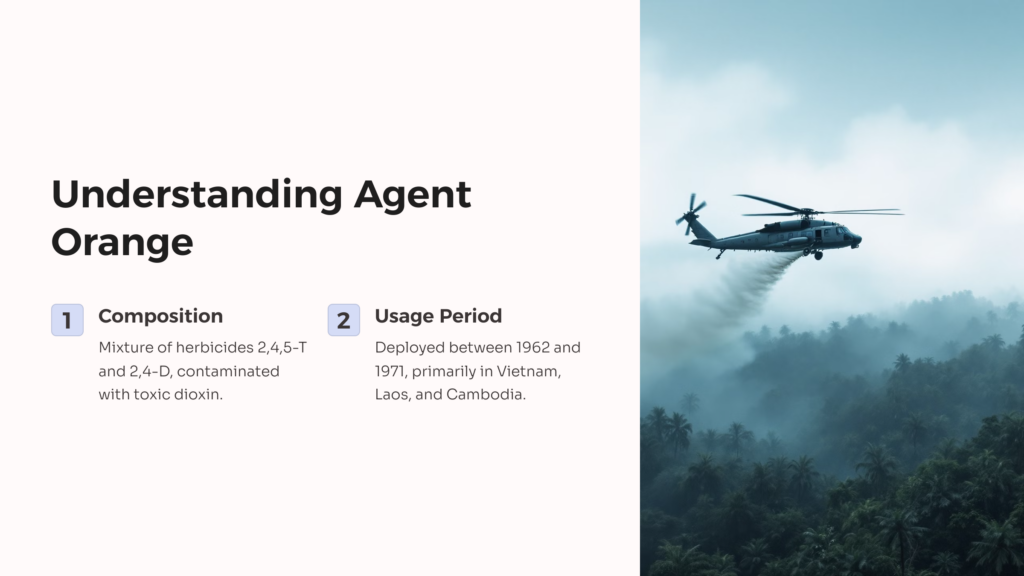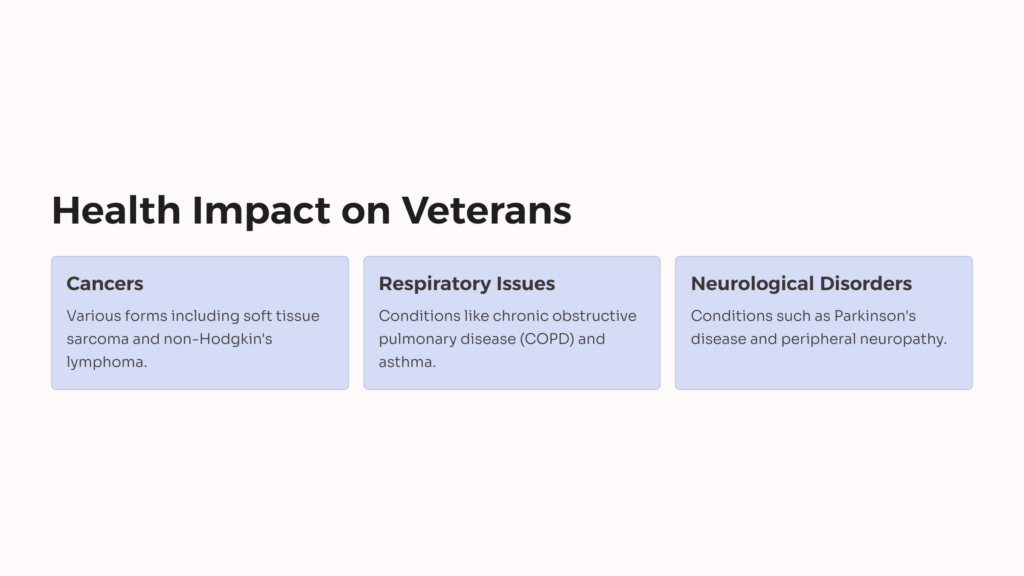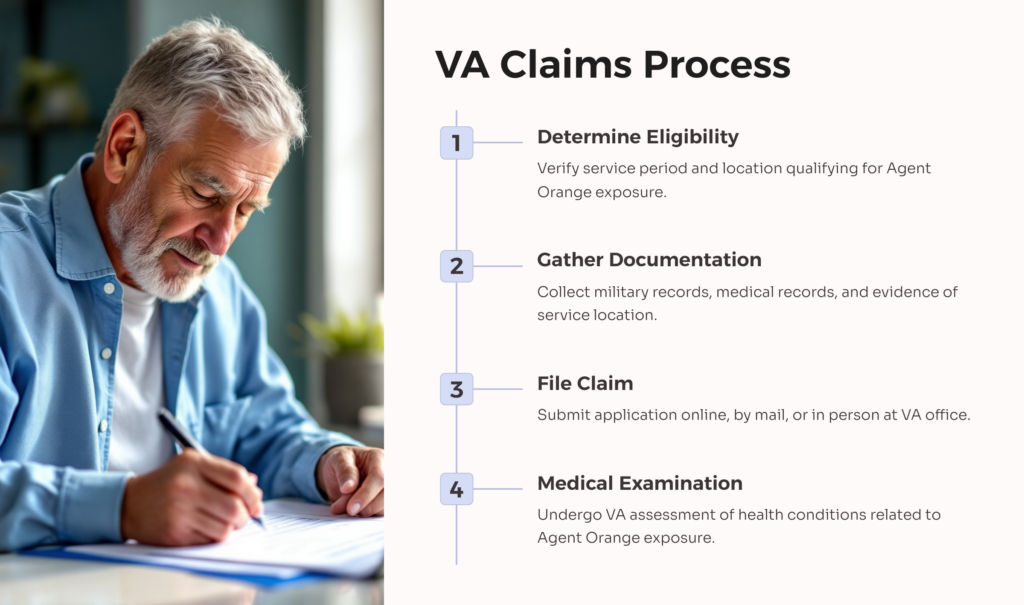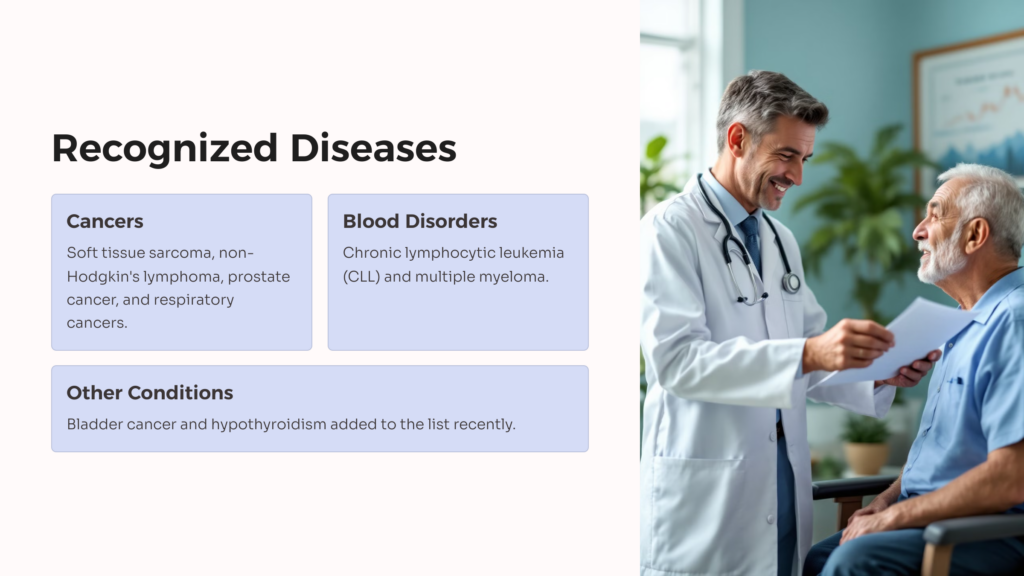Agent Orange, an herbicide infamous for its use during the Vietnam War, continues to cast a shadow over veterans who were exposed to its toxic effects.
Its deployment, intended to defoliate the dense jungle terrain, has left a lasting legacy of health issues among those who came into contact with it.
If you’re a veteran and served in the United States military between 1962 and 1975 during the Vietnam conflict, you’ve probably been exposed to this toxic herbicide.
This article explains all you need to know about Veterans Affairs (VA) claims for Agent Orange Exposure.
A Brief History of Agent Orange

During the Vietnam War, the United States military employed a series of herbicides, including Agent Orange, to strip away the dense vegetation that provided cover for enemy forces. Named for the orange stripe on its containers, Agent Orange was one of the most widely used herbicides, with over 20 million gallons sprayed across Vietnam between 1961 and 1971.
The active ingredient, dioxin, was later found to be highly toxic and carcinogenic, causing widespread environmental and human health damage.
Despite its effectiveness in clearing vegetation, Agent Orange’s devastating legacy extended far beyond its intended purpose. Its toxic components lingered in the soil and water, contaminating the environment and exposing military personnel and civilian populations to its harmful effects. The consequences of this exposure would manifest in the form of severe health complications for decades to come.
Exposure to Agent Orange has been linked to a myriad of health problems, ranging from mild to life-threatening. Among the most common conditions reported by veterans are various forms of cancer, including soft tissue sarcoma, non-Hodgkin’s lymphoma, and prostate cancer. Additionally, veterans exposed to Agent Orange have reported higher rates of respiratory disorders, such as chronic obstructive pulmonary disease (COPD) and asthma, as well as neurological disorders like Parkinson’s disease and peripheral neuropathy.

Worse still, the children of veterans exposed to Agent Orange have also experienced health issues, including birth defects or congenital disabilities and developmental disabilities. Agent Orange’s intergenerational impact highlights its use’s far-reaching consequences and underscores the urgency of addressing its aftermath.
For veterans who have suffered the adverse effects of Agent Orange exposure, VA claims serve as a vital means of seeking recognition, support, and compensation for their sacrifices. Through the VA claims process, affected veterans can access healthcare benefits, disability compensation, and other assistance tailored to their needs.
Understanding Agent Orange
Agent Orange, an herbicidal weapon used extensively during the Vietnam War, is synonymous with environmental devastation and profound human suffering.
Agent Orange is a mixture of two herbicides: 2,4,5-trichlorophenoxyacetic acid (2,4,5-T) and 2,4-dichlorophenoxyacetic acid (2,4-D). The namesake hue of Agent Orange derives from the color-coded bands marked on the barrels containing these chemicals. However, as mentioned earlier, the most notorious aspect of Agent Orange lies in its contamination of dioxin, an unintentional byproduct of the manufacturing process. Dioxin, specifically 2,3,7,8-tetrachlorodibenzo-p-dioxin (TCDD), is an exceptionally toxic compound classified as a persistent organic pollutant due to its resistance to degradation and propensity for bioaccumulation.
The deployment of Agent Orange occurred predominantly between 1962 and 1971 during the Vietnam War, with peak usage between 1967 and 1969. The jungles of Vietnam served as the primary theatre of operations for this herbicidal campaign, aimed at defoliating vegetation to deprive enemy forces of cover and sustenance. However, Agent Orange was also used in other regions, including parts of Laos and Cambodia, further exacerbating its widespread environmental contamination.
Veterans and Agent Orange Exposure
Many veterans were exposed to Agent Orange through various pathways during their service in Vietnam. The primary route of exposure was through direct contact with the herbicide during its spraying operations. Many veterans served in areas where Agent Orange was extensively deployed, putting them at risk of inhaling its toxic spray or absorbing it through their skin. The troops stationed near sprayed areas may have inadvertently come into contact with contaminated water sources or consumed food grown in soil tainted with Agent Orange residues.
Personal Stories from Veterans
The experiences of veterans exposed to Agent Orange are as diverse as they are poignant, reflecting the enduring impact of toxic exposure on their current lives and health.
‘My life changed two years ago when I was diagnosed with cancer’ – Willy Smith.
“I served as an infantryman in Vietnam during the height of Agent Orange spraying operations. Despite being initially unaware of the herbicide’s presence, I vividly recalls the distinctive smell and sight of the spray drifting over the jungle canopy during missions. Decades later, I was diagnosed with prostate cancer, a condition linked to Agent Orange exposure, prompting me to advocate tirelessly for recognition and support for affected veterans. My life changed.”
‘I wouldn’t have had kids had I known.’
I served as a nurse in a field hospital near a heavily sprayed area in Vietnam. Witnessing the influx of wounded soldiers and the pervasive effects of Agent Orange on their health, I became acutely aware of the herbicide’s toxic legacy. Years later, I developed respiratory problems and autoimmune disorders, which I attribute to my exposure to Agent Orange during my service. Now my kids suffer from inherited respiratory problems.”
Current Statistics on Veterans Suffering from Illnesses due to Agent Orange
The toll of Agent Orange exposure on veterans’ health remains a pressing concern, with a significant portion of Vietnam veterans experiencing debilitating illnesses linked to their service.
Over 3 million American soldiers served in Vietnam during these times and may have been exposed to Agent Orange.
According to the Department of Veterans Affairs (VA), over 250,000 Vietnam veterans are currently receiving disability compensation for health conditions associated with Agent Orange exposure. This includes thousands of veterans diagnosed with various forms of cancer, respiratory disorders, neurological conditions, and other ailments linked to the toxic herbicide.
Furthermore, over 300,000 U.S. veterans and over 400,000 Vietnamese people lost their lives due to exposure to Agent Orange between 1962 and 1971.
The prevalence of these claims underscores the ongoing need for comprehensive healthcare and support services tailored to the unique needs of affected veterans and their families.
Claiming VA Benefits for Agent Orange Exposure
The process of claiming VA benefits for Agent Orange exposure can be complex. Still, it is a crucial step for veterans seeking recognition and support for their service-related health issues.
Just because you were exposed to Agent Orange doesn’t mean you automatically qualify for compensation. Instead, the VA must confirm that you suffer from a medical condition linked to Agent Orange exposure.
Step-by-Step Guide on the Claims Process

Determine Eligibility: Before filing a claim, it’s essential to determine if you meet the eligibility criteria for VA benefits related to Agent Orange exposure.
Gather Documentation: Collect relevant documentation to support your claim, such as military records, medical records documenting your health conditions, and evidence of your service in Vietnam or other qualifying locations. This documentation will be essential in establishing your eligibility and the connection between your health issues and Agent Orange exposure.
File a Claim: You can initiate the claims process by applying through the VA’s online portal, by mail, or in person at a regional VA office. Be sure to provide detailed information about your military service, including the dates and locations of your service and your current health conditions.
Undergo a Medical Examination: As part of the claims process, you may be required to undergo a medical examination to assess the severity of your health conditions and their connection to your military service. A VA healthcare provider or a contracted examiner may conduct this examination.
Wait for Review and Decision: After submitting your claim, the VA will review your application and supporting documentation to determine your eligibility for benefits. This process may take several months, depending on the complexity of your case and the volume of claims being processed.
Receive Notification of Decision: Once the VA has reviewed your claim, you will receive a notification informing you of their decision. If your claim is approved, you will be notified of the benefits you are entitled to, including disability compensation, healthcare services, and other forms of assistance.
Appeal if Necessary: If your claim is denied or you disagree with the decision, you can appeal the VA’s decision. The appeals process involves requesting a review by a higher authority within the VA, providing additional evidence to support your case, and, if necessary, appearing before a review board to present your arguments.
Qualifications for Filing a Claim
To qualify for VA benefits related to Agent Orange exposure, veterans must meet the following criteria:
- Service in Vietnam between January 9, 1962, and May 7, 1975, or service in specific designated locations.
- Diagnosis of a health condition recognized by the VA as being associated with Agent Orange exposure.
- Evidence linking the health condition to military service and Agent Orange exposure.
Necessary Documentation for the Claim
When filing a claim for VA benefits related to Agent Orange exposure, veterans should gather the following documentation:
- Military service records, including discharge papers (DD214).
- Medical records documenting diagnosis and treatment of health conditions.
- Evidence of service in Vietnam or other qualifying locations, such as deployment orders or unit records.
- Any other relevant documentation supporting the connection between your health issues and Agent Orange exposure.
By following these steps and providing the necessary documentation, veterans can undergo the claims process more effectively and increase their chances of receiving the benefits they deserve for their service-related health issues.
Diseases Recognized by VA as connected to Agent Orange as of 2018

Soft Tissue Sarcoma: Soft tissue sarcoma is a cancer that develops in the soft tissues of the body, such as muscles, fat, and blood vessels. Exposure to Agent Orange has been linked to an increased risk of developing soft tissue sarcoma, particularly in Vietnam veterans.
Non-Hodgkin’s Lymphoma: Non-Hodgkin’s lymphoma is a cancer that affects the lymphatic system, which is responsible for fighting infection and disease.
Hodgkin’s Disease: Hodgkin’s disease, also known as Hodgkin’s lymphoma, is a type of cancer that affects the lymphatic system. While the exact cause is unknown, exposure to Agent Orange has been identified as a risk factor for developing Hodgkin’s disease, particularly among Vietnam veterans.
Chronic Lymphocytic Leukemia (CLL): CLL is a type of cancer that affects the white blood cells and is characterized by the overproduction of abnormal lymphocytes.
Multiple Myeloma: Multiple myeloma is a cancer that affects plasma cells in the bone marrow. Research suggests that exposure to Agent Orange may contribute to the development of multiple myeloma, particularly among Vietnam veterans.
Respiratory Cancers (including lung, bronchus, larynx, and trachea): Exposure to Agent Orange has been associated with an elevated risk of developing various respiratory cancers, including lung cancer, bronchus cancer, laryngeal cancer, and tracheal cancer. The carcinogenic properties of dioxin, a component of Agent Orange, are believed to contribute to the development of these cancers.
Prostate Cancer: Vietnam veterans exposed to Agent Orange have an increased risk of developing this disease. The exact mechanisms by which Agent Orange exposure influences prostate cancer risk are still being studied.
Latest Additions to the List:
- Bladder Cancer
- Hypothyroidism
The Role of the Blue Water Navy Veterans in Agent Orange VA Claims
Blue Water Navy Veterans, a group of servicemen who served aboard ships in the waters off the coast of Vietnam during the Vietnam War, have faced unique challenges in seeking recognition and benefits for health issues related to Agent Orange exposure. Despite their proximity to the affected areas, Blue Water Navy Veterans initially encountered significant hurdles in accessing the same benefits afforded to their counterparts who served on the ground.
Who are Blue Water Navy Veterans?
Blue Water Navy Veterans are members of the U.S. Navy who served aboard ships deployed in the waters off the coast of Vietnam during the Vietnam War. While these veterans did not set foot on Vietnamese soil, they were exposed to the same toxic herbicides, including Agent Orange, as troops who served on land. The term “Blue Water Navy” distinguishes these sailors from “Brown Water Navy” personnel, who operated in the inland waterways of Vietnam.
Struggle for Benefits
For decades, Blue Water Navy Veterans faced challenges in proving their eligibility for benefits related to Agent Orange exposure. Unlike veterans who served on land or in the inland waterways of Vietnam, Blue Water Navy Veterans were initially not considered eligible for the same presumption of exposure to Agent Orange. This discrepancy left many Blue Water Navy Veterans without access to crucial healthcare and compensation for conditions linked to herbicide exposure.
The primary issue stemmed from the lack of evidence documenting direct exposure to Agent Orange among Blue Water Navy Veterans. While troops on the ground could provide eyewitness accounts or documentation of proximity to spraying operations, Blue Water Navy Veterans needed more evidence due to the nature of their service. As a result, their claims for benefits related to Agent Orange exposure were often denied or delayed.
The Blue Water Navy Act of 2019
Recognizing the injustice Blue Water Navy Veterans faced, Congress passed the Blue Water Navy Vietnam Veterans Act of 2019. This landmark legislation aimed to extend the presumption of exposure to Agent Orange to Blue Water Navy Veterans, thereby granting them access to VA benefits for conditions linked to herbicide exposure.
“The Blue Water Navy (BWN) Vietnam Veterans Act of 2019 (PL 116-23) extended the presumption of herbicide exposure, such as Agent Orange, to Veterans who served in the offshore waters of the Republic of Vietnam between January 9, 1962 and May 7, 1975.”
Key provisions of the Blue Water Navy Act of 2019 include:
Presumption of Exposure: The act established a presumption of exposure to Agent Orange for Blue Water Navy Veterans who served within the territorial seas of Vietnam, defined as waters within 12 nautical miles of the coast. This presumption facilitates easier access to VA benefits for conditions recognized as associated with Agent Orange exposure.
Expansion of Benefits: Blue Water Navy Veterans who are now recognized as having been exposed to Agent Orange are eligible for the same healthcare and compensation benefits as veterans who served on land or in the inland waterways of Vietnam. This includes disability compensation, healthcare services, and other assistance tailored to their needs.
Retroactive Benefits: The Blue Water Navy Act of 2019 allows retroactive benefits dating back to January 1, 2019, providing compensation and healthcare coverage for conditions related to Agent Orange exposure for eligible Blue Water Navy Veterans.
Impact on Veterans
While the VA claims process for Agent Orange exposure aims to provide recognition and support to affected veterans, several challenges may hinder successful claims. Common reasons for claim rejections include insufficient evidence of exposure, lack of documentation linking health conditions to Agent Orange, and administrative errors. Here are some potential challenges and case studies illustrating veterans’ difficulties in claiming benefits.
Common Reasons for Claim Rejections
Insufficient Evidence of Exposure: Veterans must provide documentation demonstrating their presence in areas where Agent Orange was used. Lack of official records or eyewitness testimony can make it challenging to prove exposure, leading to claim denials.
Lack of Documentation Linking Health Conditions: Even if exposure to Agent Orange is established, veterans must provide medical evidence linking their health conditions to herbicide exposure. Without comprehensive medical records or expert opinions, claims may be rejected due to insufficient evidence.
Administrative Errors: Errors in completing claim forms, inaccuracies in medical records, or miscommunication with VA representatives can result in claim denials or delays. Veterans must ensure that all paperwork is completed accurately and thoroughly.
Case Studies of Challenges Faced by Veterans
Bradley’s Struggle for Recognition: Bradley, a Vietnam veteran, served in an area heavily sprayed with Agent Orange during the war. Years later, he developed prostate cancer, a condition linked to herbicide exposure. Despite providing documentation of his service and medical records confirming his diagnosis, Bradley’s initial claim for benefits was denied due to a lack of evidence linking his cancer to Agent Orange. Only after appealing the decision and obtaining additional medical opinions did John finally receive the benefits he deserved.
Sarah’s Documentation Dilemma: Sarah, a Blue Water Navy Veteran, served aboard a ship off the coast of Vietnam during the war. Despite being exposed to Agent Orange, Sarah struggled to obtain documentation proving her ship’s proximity to sprayed areas. Sarah’s claim for benefits was repeatedly denied without concrete evidence of exposure. It wasn’t until she collaborated with fellow veterans and advocacy groups to gather supporting evidence that Sarah’s claim was ultimately approved.
David’s Administrative Oversight: David, a veteran suffering from respiratory issues believed to be related to Agent Orange exposure, submitted a claim for benefits with incomplete medical documentation. Due to administrative errors and missing information, his claim was rejected multiple times. It wasn’t until David sought assistance from a veterans’ service organization and diligently corrected the paperwork that his claim was approved.
Legal support for Agent Orange VA Claims
Seeking legal guidance for Agent Orange VA claims can significantly enhance veterans’ chances of success in going through the complex claims process and obtaining the benefits they deserve. Legal professionals specializing in veterans’ rights can provide valuable assistance in gathering evidence, preparing claims, appealing denials, and advocating for veterans’ interests.
Importance and Benefits of Legal Guidance
Expertise in VA Law: Legal professionals specializing in veterans law are well-versed in the intricacies of VA regulations and procedures. They can offer valuable insights into the claims process, ensuring veterans understand their rights and obligations under the law.
Evidence Gathering and Documentation: Legal representatives can assist veterans in gathering the necessary evidence and documentation to support their claims, including military records, medical records, and expert opinions linking health conditions to Agent Orange exposure. This thorough documentation is crucial for establishing the validity of claims and maximizing the chances of approval.
Appeal Representation: In cases where claims are denied or disputed, legal professionals can provide representation during appeals. They can prepare persuasive arguments, present additional evidence, and advocate on behalf of veterans to challenge unfavorable decisions and secure the benefits they deserve.
Simplifying Complexities: The VA claims process can be complex and daunting for veterans, especially those needing more documentation or administrative errors. Legal guidance can help veterans navigate these complexities, ensuring their claims are prepared correctly and submitted according to VA requirements.
Top Organizations/Law Firms Providing Support for Veterans
Disabled American Veterans (DAV): DAV is a nonprofit organization dedicated to advocating for disabled veterans’ rights and providing assistance with VA benefits claims. They offer free representation and support services to veterans seeking assistance with Agent Orange-related claims and other service-connected disabilities.
Vietnam Veterans of America (VVA): VVA is a nonprofit organization that provides advocacy, support, and services to Vietnam-era veterans and their families. They offer assistance with VA benefits claims, including those related to Agent Orange exposure, through their network of service officers and legal professionals.
National Veterans Legal Services Program (NVLSP): NVLSP is a nonprofit organization that provides free legal representation and advocacy for veterans and their families. They specialize in veterans’ benefits law and offer assistance with VA claims, including those involving Agent Orange exposure and related health conditions.
Veterans Pro Bono Consortium (VPBC): VPBC is a network of law firms and legal professionals dedicated to providing pro bono legal assistance to veterans in need. They offer free legal representation and advocacy services for veterans seeking assistance with VA claims, including those related to Agent Orange exposure.
Future of VA claims related to Agent Orange
As we look to the future, several potential changes in the VA claims process for Agent Orange-related conditions and advancements in medical research hold promise for veterans seeking recognition and support for their service-related health issues.
Potential Changes in the Claims Process
Streamlined Procedures: The VA may implement streamlined procedures to expedite the processing of claims related to Agent Orange exposure. This could include improved digital systems for submitting claims, enhanced communication channels for veterans, and more efficient review processes to reduce waiting times and delays.
Expanded Eligibility Criteria: There may be efforts to expand eligibility criteria for VA benefits related to Agent Orange exposure, including recognizing additional health conditions as presumptively linked to herbicide exposure. This could involve ongoing review and assessment of scientific evidence to identify emerging health concerns among veterans exposed to Agent Orange.
Enhanced Outreach and Education: The VA may invest in enhanced outreach and education initiatives to raise veterans’ awareness about the availability of benefits for Agent Orange-related conditions and how to navigate the claims process effectively. These initiatives could include targeted outreach campaigns, educational resources, and partnerships with veterans’ organizations to reach underserved populations.
Improved Collaboration with Medical Professionals: The VA may strengthen collaboration with medical professionals and researchers to improve the evaluation and adjudication of claims related to Agent Orange exposure. This could involve developing standardized protocols for assessing health conditions, establishing expert panels to review medical evidence, and fostering interdisciplinary collaboration to address complex cases.
Possible Advancements in Medical Research Related to Agent Orange
Identification of New Health Effects: Ongoing medical research may uncover new health effects associated with Agent Orange exposure, expanding our understanding of the long-term consequences of herbicide exposure on veterans’ health. This could lead to recognizing additional health conditions eligible for VA benefits and informing targeted healthcare interventions for affected veterans.
Development of Novel Treatments: Advances in medical research may lead to the development of novel treatments for health conditions linked to Agent Orange exposure, offering new therapeutic options for affected veterans. This could include targeted therapies, immunomodulatory drugs, and precision medicine approaches tailored to individual veterans’ health needs.
Genetic and Epigenetic Studies: Research into the genetic and epigenetic effects of Agent Orange exposure may provide insights into the underlying mechanisms of disease development among exposed veterans. This could lead to personalized risk assessments, genetic screening tests, and targeted interventions to mitigate the impact of genetic and environmental factors on veterans’ health.
Wrapping up
The importance of VA benefits for veterans exposed to Agent Orange cannot be overstated. These benefits provide crucial support and recognition for veterans who have sacrificed their health in service to their country. By accessing VA benefits, veterans exposed to Agent Orange can receive essential healthcare services, disability compensation, and other forms of assistance tailored to their specific needs.
As we reflect on the challenges faced by veterans in claiming benefits related to Agent Orange exposure, it is evident that continued advocacy and support are essential. Veterans and organizations must remain vigilant in advocating for the rights of affected individuals, ensuring they receive the benefits and support they deserve for their service-related sacrifices.
Through collaboration, outreach, and education, we can empower veterans to navigate the VA claims process effectively and access the benefits they need to lead healthy and fulfilling lives. Let us stand together in solidarity with veterans exposed to Agent Orange, advocating for their rights and working towards a future where all veterans receive the recognition, support, and care they rightfully deserve.
 AllVeteran.com Advisors
AllVeteran.com Advisors
With expertise spanning local, state, and federal benefit programs, our team is dedicated to guiding individuals towards the perfect program tailored to their unique circumstances.


















